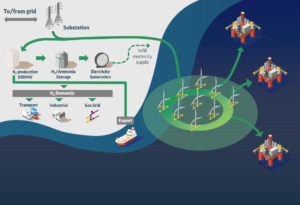Environment, Social and Governance

Floating wind, hydrogen proposal aims to accelerate decarbonization of UK offshore oil and gas assets
A UK-based company called Cerulean Winds has proposed a plan to help accelerate the decarbonization of oil and gas assets on the UK Continental Shelf (UKCS).
The £10 billion proposal calls for a 200-turbine floating wind and hydrogen development, which the company says can abate 20 million tonnes of CO2. A formal request for seabed leases has been submitted to Marine Scotland. The proposed development involves:
• Over 200 of the largest floating turbines at sites West of Shetland and in the Central North Sea, with 3 GW/hr of capacity; this would feed power to offshore facilities and in excess of 1.5 GW/hr of power to onshore green hydrogen plants.
• Ability to electrify the majority of current UKCS assets, as well as future production potential from 2024, to reduce emissions.
• 100% availability of green power to offshore platforms at a price below current gas turbine generation through a self-sustained scheme with no upfront cost to operators.
• The development of green hydrogen at scale and £1 billion hydrogen export potential.
Cerulean estimates that 160,000 existing oil and gas jobs can be safeguarded and 200,000 new roles within the floating wind and hydrogen sectors would be created within the next five years. The company says it has undertaken the necessary infrastructure planning for the scheme to ensure the required level of project readiness, targeting financial close in Q1 2022. Construction would start soon after, with energization expected to commence in 2024.
Talos Energy sets goal of 30% reduction in greenhouse gas emissions intensity by 2025
Talos Energy has strengthened its ESG commitments with the establishment of long-term emissions reductions targets and further linkage of executive compensation to ESG performance in advance of its 2021 ESG report, expected to be released in Q3 2021. Additionally, the company provided select 2020 ESG performance statistics.
Talos announced a target of 30% reduction in greenhouse gas emissions intensity by 2025 from the baseline 2018 levels established in its 2020 ESG report. ESG-driven metrics have also been increased to account for 20% of management’s annual incentive plan, and they include key initiatives aimed at emissions reduction and health and safety metrics. Production metrics were eliminated from the annual incentive plan scorecard, and maximum category payouts were reduced from 200% of targets to 150%.
Talos’ ESG performance updates for 2020 included:
• A 20% reduction in greenhouse gas emissions intensity from 2018 levels;
• A 20% reduction in flaring and venting emissions from 2019 levels; Talos continues to have zero routine flaring;
• Less than three-fourths of one barrel of oil was released from over 23 million gross operated barrels produced through Talos-operated production facilities.
The company also established an employee-led internal ESG committee whose members are working on emissions reduction, safety, diversity and inclusion, community relations, and energy transition initiatives.
Odfjell Drilling aims for net-zero emissions by 2050
In its 2020 Sustainability Report released in late April, Odfjell Drilling says it is aiming to reduce carbon emissions by 40% from 2019 levels in the next five years, with an ultimate goal of becoming net-zero by 2050.
Improved energy efficiency in the company’s rig fleet will be the primary driver for achieving net-zero. Odfjell will prioritize optimizing procedures for power consuming operations, according to the report.
Odfjell reported a decline in CO2e Scope 1 emissions, from 238,000 tonnes in 2019 to 235,000 tonnes in 2020. The company also touted the installation of a flywheel and battery power package on the Deepsea Atlantic semisubmersible last year, which helped reduce emissions from the rig by 40%. Odfjell said it aims to have the package retrofitted on its entire rig fleet by 2026.
Five countries establish net-zero producers forum
The Energy Ministries of Canada, Norway, Qatar, Saudi Arabia and the United States have announced that they will form the Net-Zero Producers Forum as part of the countries’ climate commitments. The five countries, collectively, represent 40% of global oil and gas production.
The forum will be dedicated to developing long-term strategies to reach global net-zero emissions, including methane abatement, as well as carbon capture and storage technologies. DC





